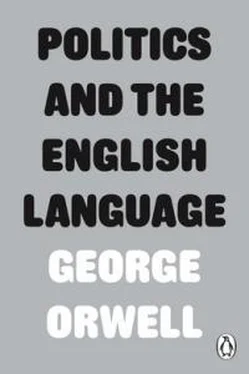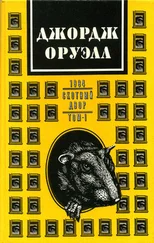Джордж Оруэлл - Politics and the English Language
Здесь есть возможность читать онлайн «Джордж Оруэлл - Politics and the English Language» весь текст электронной книги совершенно бесплатно (целиком полную версию без сокращений). В некоторых случаях можно слушать аудио, скачать через торрент в формате fb2 и присутствует краткое содержание. Год выпуска: 2015, Издательство: epubBooks Classics, Жанр: Публицистика, на английском языке. Описание произведения, (предисловие) а так же отзывы посетителей доступны на портале библиотеки ЛибКат.
- Название:Politics and the English Language
- Автор:
- Издательство:epubBooks Classics
- Жанр:
- Год:2015
- ISBN:нет данных
- Рейтинг книги:4 / 5. Голосов: 1
-
Избранное:Добавить в избранное
- Отзывы:
-
Ваша оценка:
- 80
- 1
- 2
- 3
- 4
- 5
Politics and the English Language: краткое содержание, описание и аннотация
Предлагаем к чтению аннотацию, описание, краткое содержание или предисловие (зависит от того, что написал сам автор книги «Politics and the English Language»). Если вы не нашли необходимую информацию о книге — напишите в комментариях, мы постараемся отыскать её.
Politics and the English Language — читать онлайн бесплатно полную книгу (весь текст) целиком
Ниже представлен текст книги, разбитый по страницам. Система сохранения места последней прочитанной страницы, позволяет с удобством читать онлайн бесплатно книгу «Politics and the English Language», без необходимости каждый раз заново искать на чём Вы остановились. Поставьте закладку, и сможете в любой момент перейти на страницу, на которой закончили чтение.
Интервал:
Закладка:
Politics and the English Language
George Orwell
Most people who bother with the matter at all would admit that the English language is in a bad way, but it is generally assumed that we cannot by conscious action do anything about it. Our civilization is decadent, and our language—so the argument runs—must inevitably share in the general collapse. It follows that any struggle against the abuse of language is a sentimental archaism, like preferring candles to electric light or hansom cabs to aeroplanes. Underneath this lies the half–conscious belief that language is a natural growth and not an instrument which we shape for our own purposes.
Now, it is clear that the decline of a language must ultimately have political and economic causes: it is not due simply to the bad influence of this or that individual writer. But an effect can become a cause, reinforcing the original cause and producing the same effect in an intensified form, and so on indefinitely. A man may take to drink because he feels himself to be a failure, and then fail all the more completely because he drinks. It is rather the same thing that is happening to the English language. It becomes ugly and inaccurate because our thoughts are foolish, but the slovenliness of our language makes it easier for us to have foolish thoughts. The point is that the process is reversible. Modern English, especially written English, is full of bad habits which spread by imitation and which can be avoided if one is willing to take the necessary trouble. If one gets rid of these habits one can think more clearly, and to think clearly is a necessary first step towards political regeneration: so that the fight against bad English is not frivolous and is not the exclusive concern of professional writers. I will come back to this presently, and I hope that by that time the meaning of what I have said here will have become clearer. Meanwhile, here are five specimens of the English language as it is now habitually written.
These five passages have not been picked out because they are especially bad—I could have quoted far worse if I had chosen—but because they illustrate various of the mental vices from which we now suffer. They are a little below the average, but are fairly representative samples. I number them so that I can refer back to them when necessary:
(1) I am not, indeed, sure whether it is not true to say that the Milton who once seemed not unlike a seventeenth–century Shelley had not become, out of an experience ever more bitter in each year, more alien (sic) to the founder of that Jesuit sect which nothing could induce him to tolerate.
PROFESSOR HAROLD LASKI (Essay in Freedom of Expression)
(2) Above all, we cannot play ducks and drakes with a native battery of idioms which prescribes such egregious collocations of vocables as the Basic put up with or tolerate or put at a loss or bewilder.
PROFESSOR LANCELOT HOGBEN (Interglossa)
(3) On the one side we have the free personality; by definition it is not neurotic, for it has neither conflict nor dream. Its desires, such as they are, are transparent, for they are just what institutional approval keeps in the forefront of consciousness; another institutional pattern would alter their number and intensity; there is little in them that is natural, irreducible, or culturally dangerous. But on the other side, the social bond itself is nothing but the mutual reflection of these self–secure integrities. Recall the definition of love. Is not this the very picture of a small academic? Where is there a place in this hall of mirrors for either personality or fraternity?
ESSAY ON PSYCHOLOGY in Politics (New York)
(4) All the "best people" from the gentlemen's clubs, and all the frantic fascist captains, united in common hatred of Socialism and bestial horror of the rising tide of the mass revolutionary movement, have turned to acts of provocation, to foul incendiarism, to medieval legends of poisoned wells, to legalize their own destruction of proletarian organizations, and rouse the agitated petty–bourgeoisie to chauvinistic fervor on behalf of the fight against the revolutionary way out of the crisis.
COMMUNIST PAMPHLET
(5) If a new spirit is to be infused into this old country, there is one thorny and contentious reform which must be tackled, and that is the humanization and galvanization of the B.B.C. Timidity here will bespeak canker and atrophy of the soul. The heart of Britain may lee sound and of strong beat, for instance, but the British lion's roar at present is like that of Bottom in Shakespeare's Midsummer Night's Dream—as gentle as any sucking dove. A virile new Britain cannot continue indefinitely to be traduced in the eyes, or rather ears, of the world by the effete languors of Langham Place, brazenly masquerading as "standard English." When the Voice of Britain is heard at nine o'clock, better far and infinitely less ludicrous to hear aitches honestly dropped than the present priggish, inflated, inhibited, school–ma'am–ish arch braying of blameless bashful mewing maidens.
LETTER IN Tribune
Each of these passages has faults of its own, but quite apart from avoidable ugliness, two qualities are common to all of them. The first is staleness of imagery; the other is lack of precision. The writer either has a meaning and cannot express it, or he inadvertently says something else, or he is almost indifferent as to whether his words mean anything or not. This mixture of vagueness and sheer incompetence is the most marked characteristic of modern English prose, and especially of any kind of political writing. As soon as certain topics are raised, the concrete melts into the abstract and no one seems able to think of turns of speech that are not hackneyed: prose consists less and less of words chosen for the sake of their meaning, and more and more of phrases tacked together like the sections of a prefabricated hen–house. I list below, with notes and examples, various of the tricks by means of which the work of prose–construction is habitually dodged:
Dying metaphors. A newly–invented metaphor assists thought by evoking a visual image, while on the other hand a metaphor which is technically "dead" (e.g., iron resolution) has in effect reverted to being an ordinary word and can generally be used without loss of vividness. But in between these two classes there is a huge dump of worn–out metaphors which have lost all evocative power and are merely used because they save people the trouble of inventing phrases for themselves. Examples are: Ring the changes on, take up the cudgels for, toe the line, ride roughshod over, stand shoulder to shoulder with, play into the hands of, an axe to grind, grist to the mill, fishing in troubled waters, on the order of the day, Achilles' heel, swan song, hotbed. Many of these are used without knowledge of their meaning (what is a "rift," for instance?), and incompatible metaphors are frequently mixed, a sure sign that the writer is not interested in what he is saying. Some metaphors now current have been twisted out of their original meaning without those who use them even being aware of the fact. For example, toe the line is sometimes written tow the line. Another example is the hammer and the anvil, now always used with the implication that the anvil gets the worst of it. In real life it is always the anvil that breaks the hammer, never the other way about: a writer who stopped to think what he was saying would be aware of this, and would avoid perverting the original phrase.
Operators, or verbal false limbs. These save the trouble of picking out appropriate verbs and nouns, and at the same time pad each sentence with extra syllables which give it an appearance of symmetry. Characteristic phrases are: render inoperative, militate against, prove unacceptable, make contact with, be subjected to, give rise to, give grounds for, having the effect of, play a leading part (role) in, make itself felt, take effect, exhibit a tendency to, serve the purpose of, etc.
Читать дальшеИнтервал:
Закладка:
Похожие книги на «Politics and the English Language»
Представляем Вашему вниманию похожие книги на «Politics and the English Language» списком для выбора. Мы отобрали схожую по названию и смыслу литературу в надежде предоставить читателям больше вариантов отыскать новые, интересные, ещё непрочитанные произведения.
Обсуждение, отзывы о книге «Politics and the English Language» и просто собственные мнения читателей. Оставьте ваши комментарии, напишите, что Вы думаете о произведении, его смысле или главных героях. Укажите что конкретно понравилось, а что нет, и почему Вы так считаете.












